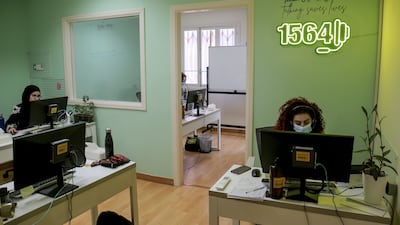A critical mental health service for people affected by Lebanon's compounding economic and political crisis is under threat of closure, potentially leaving some of the country's most vulnerable people stranded without support.
Embrace, an NGO dedicated to mental health awareness in Lebanon, suspended its emotional support and suicide prevention hotline on August 14 and 15 after severe fuel shortages forced them to shut down their services.
“We are absolutely heartbroken,” said Dr Reve Romanos, clinical supervisor of the Embrace lifeline. “We really tried our best to avoid this but we’re completely helpless.”
The Embrace lifeline was launched in 2017 in partnership with the National Mental Health Programme at the Ministry of Public Health in Lebanon. Since then, it has received 14,260 calls.
The NGO further amplified its efforts after August 4, 2020, when a devastating blast at Beirut port killed at least 214 people, injured thousands more and left many to suffer from unseen wounds.
“For the past three years, we never once closed down,” Dr Romanos told The National.
“We were injured and traumatised by the explosion but we sat between broken glass and responded to all our calls. We were always there for people no matter what but this decision is beyond us.”

While Lebanon has struggled with power cuts since the end of its 15-year civil war in 1990, acute fuel shortages have plunged the country into further darkness in recent weeks.
State-run electricity company Electricite du Liban provides as little as two hours of power per day and private generators can do little to compensate for the deficiencies, as they too are running out of fuel.
The crisis has affected homes, businesses and even hospitals, which are at risk of closure.
“This is very, very dangerous,” Dr Romanos told The National. “There are no words to describe what people are going through and cutting them off like this is a huge responsibility.”
Embrace operators experienced the peril of the crisis first-hand when they received a critical call last week: call centre staff said they were down to just 10 minutes of power to de-escalate the situation before their alternative power source also gave away.
“It was extremely stressful and it felt like a race against time,” Dr Romanos said. “People's lives are on the line.”
Before the fuel crisis, the Embrace lifeline operated between 8.30am and 5.30am, with plans to offer round-the-clock support.
Instead, they were forced to cut back their hours.
“Even though we’re working fewer hours, the content of the calls we’re getting is very heavy,” Dr Romanos said.
“People are wishing death upon themselves. They’re helpless, hopeless and have nothing to look forward to.”
Despite the challenges posed by Lebanon's economic collapse, Embrace is working tirelessly to find alternatives and resume their services.
The NGO organised an Instagram live session titled 'Emotional Support For All', where they invited people to tune in and express themselves in a safe space.
"Not a pandemic, not road blockage, not fuel and most definitely not our politicians will stop us from supporting each other," tweeted one Embrace volunteer. "We will sit with you in the dark."


